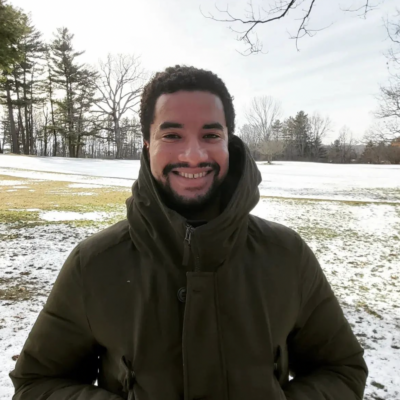Student Spotlight: Jason Ludwig

April 22, 2024
Jason Ludwig is a doctoral candidate in science and technology studies from Brooklyn, New York. He earned a B.A. in history and M.S. in science, technology, and society at Drexel University and now studies the role of computing in reshaping politics of racial equality under the guidance of Sara Pritchard at Cornell.
What is your area of research and why is it important?
My dissertation, “Automating Blackness: Race, Computing, and Politics in the Postwar United States,” examines the central role of computing in reshaping the late 20th century politics of racial equality. Essentially, I tell the history of policymakers, civil rights leaders, and programmers who have tried to situate computing as a technical solution to the problem of racial inequality. I do this by tracing the politics of race and data through four government computing projects which affected the lives of millions of Americans. In doing so, I aim provide a new perspective on the promises and perils of the technological solutionism that has shaped U.S. social policy in recent decades.
What are the larger implications of this research?
This research speaks to contemporary concerns about algorithmic bias and inequities in computing and information technologies more broadly. By highlighting the political forces and technical designs that have driven computational inequalities in the past, I highlight different ways in which the most harmful elements of computing might be dismantled, subverted, or retooled. I also try to recover marginalized and subversive ideas about race and computing—particularly those that emerged from activists for racial justice. I consider how these visions might reframe contemporary debates around computation and racial discrimination. This kind of historical research can offer important context for lawmakers, data justice activists, and computer scientists committed to creating more just computing systems, especially as we grapple with the consequences of new technologies like AI—as I lay out in this piece for Public Books.
What does it mean to you to be a Bouchet Scholar?
It is a great honor to be named a Bouchet Scholar. The Bouchet Honor Society has done a lot of work to advance diversity in higher education by fostering environments of belonging, support, and mentorship for scholars from backgrounds underrepresented in academia. Particularly at a moment in which the diversification of higher education is under attack, institutions like this one are of vital importance. I look forward to benefiting from the supports in place for Bouchet Scholars, and also contributing to the society’s mission.
How do you exemplify the five pillars of the Bouchet Society—character, leadership, advocacy, scholarship, and service?
One of the things that I’m most proud of that aligns with the Bouchet Society’s pillars is my work as a member of the Committee on Racial Equity, Diversity, and Inclusion for the Society for the History of Technology, the largest global association for historians of technology. In this position, I have taken on leadership roles in diversifying my broader professional field. I have administered awards and travel grants for scholars from underrepresented backgrounds; organized panels on systemic racism and epistemic diversity within the history of technology; and helped to implement conference disability access plans. This has been some of the most rewarding work I have done to date, and has helped me (and I hope others!) think about the history of technology in a more expansive and exciting way.
President Pollack has designated this academic year’s theme as freedom of expression. What does freedom of expression mean to you?
I believe that freedom of expression is an important pillar of modern societies. It is not, however, something that can simply arise and exist all on its own. Freedom of expression has to be constantly supported and defended. Frankly, the attacks on free speech in recent times are alarming—and that ranges from outright censorship and social media witch-hunts to the more subtle ways that online algorithms organize what kinds of posts are seen or not seen. I’m happy that it is our theme this academic year because I think a lot of these problems are only going to grow. I hope that some good ideas and outcomes emerge out of the ongoing discussions on campus.
What are your hobbies or interests outside of your research or scholarship?
I love to read fiction and watch films. I’ve also recently taken up kickboxing. But my main passion is soccer—both watching and playing it. I’m a long-suffering fan of Manchester United and the New York Red Bulls, two teams with a painful recent history of on-the-field failure. I also used to play for a local team in Ithaca called Leo’s Legion, but playing regularly has become a bit too hard on my knees lately!
Why did you choose Cornell to pursue your degree?
When I visited Cornell for the first time back in 2019 to meet my advisor, Sara Pritchard, and the rest of the science and technology studies faculty, I instantly had the feeling that the department was a supportive environment where I could receive the kind of mentorship that would help me grow as both a scholar and a human being. Five years on, I can happily say that my intuition was correct!
